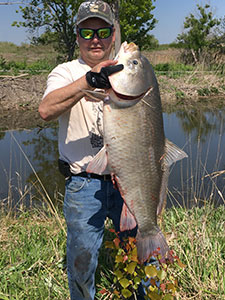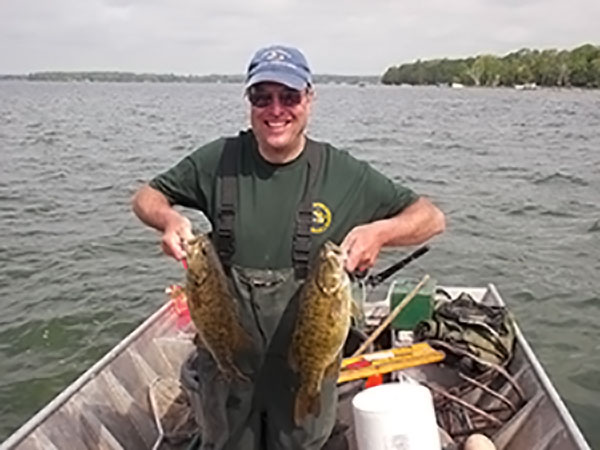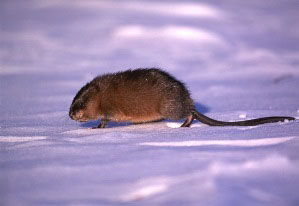- Details
(Provided by MDNR)
Michigan DNR wildlife biologists estimate the number of moose in the western Upper Peninsula core population area at 378 animals, up from 285 in 2015.
"Our survey findings this year are encouraging because a possible population decline detected in 2015 was transitory," said Dean Beyer, a Michigan DNR wildlife research biologist who organizes the sampling and generates the estimate for the biannual survey effort.
Moose are found in Michigan at Isle Royale National Park and in two population areas on the mainland of the Upper Peninsula.
The western U.P. moose range covers about 1,400 square miles in parts of Marquette, Baraga, and Iron counties. The population there is the result of moose reintroduction efforts in 1985 and 1987.
- Details
(Provided by MDNR)
 Bow Fisherman Breaks Bigmouth Buffalo Mark - Again
Bow Fisherman Breaks Bigmouth Buffalo Mark - Again
The Michigan DNR recently confirmed a new state-record fish for bigmouth buffalo. This marks the first state-record fish caught in 2017 and it was caught by an angler who held the previous state record for bigmouth buffalo from 2008.
- Details
(Provided by MDNR)
 Lake Margrethe Shows Plenty of Angling Opportunity
Lake Margrethe Shows Plenty of Angling Opportunity
At 1,922 acres, Lake Margrethe is the largest lake in Crawford County in Michigan's northern Lower Peninsula. Located just a couple of miles west of Grayling, it is easy to get to, making it one of the most popular fishing lakes in this part of the state.
It has long been stocked by the Michigan DNR with walleye and Great Lakes-strain muskellunge, but had not been surveyed since 2007 (general netting survey) and 2009 (fall electrofishing survey targeting walleye). Walleye had recently been stocked in 2011, 2013 and 2015, and muskellunge were stocked in 2012 and 2014 (plus Northern-strain muskellunge a number of years prior). So it was time for the DNR to go see how the fish populations of Lake Margrethe were doing.
DNR, Fisheries Division staff decided to get an early start on it, knowing an early effort could allow them a successful catch, particularly of muskellunge. The crew set nets on April 25, 2016. However, Mother Nature did not cooperate, and no muskies were captured.
- Details
(Provided by MDNR)
The Michigan DNR, in partnership with the Michigan Muskie Alliance, is investigating the muskellunge fisheries of the state again this year by distributing an online angler survey.
The 2017 Muskellunge Angler Survey will gather information about muskellunge angler demographics and catch data. Muskellunge anglers have been surveyed since 2014, but only online since 2016. Traditional methods, including creel and postcards, have not been as successful as collecting information through electronic means. The current survey can be found on the DNR website at michigan.gov/muskie and the Michigan Muskie Alliance website at www.michiganmuskiealliance.org/.
- Details
(Provided by MDNR)
 Just What Are Muskrats?May is American Wetlands Month - a month to appreciate and enjoy the wonders of wetlands! Take some time to experience this amazing native ecosystem by visiting one of Michigan's Wetland Wonders. There, you may find one of Michigan's most fascinating aquatic mammals - the muskrat.
Just What Are Muskrats?May is American Wetlands Month - a month to appreciate and enjoy the wonders of wetlands! Take some time to experience this amazing native ecosystem by visiting one of Michigan's Wetland Wonders. There, you may find one of Michigan's most fascinating aquatic mammals - the muskrat.
Muskrats are a rich brown color and are roughly 18-25 inches long from the tip of their nose to the end of their hairless, round, brown tails. They weigh about 2-3 pounds and have partially webbed hind feet to help them swim in the marshes, lakes, ponds and slow-moving streams they inhabit.
Plants are the primary food source for muskrats, including the roots and stems of aquatic plants like cattails, arrowhead, waterlily and rushes. Muskrats will also sometimes eat meat, including fish, crayfish, mussels, turtles and frogs. Muskrats usually feed within 50 to 500 feet of their den.
Muskrats build dens, with one or more underwater entrances, in the sides of elevated banks along streams, lakes and ponds. In marshy areas, muskrats build their homes out of cattails. These cattail houses can be up to 6 feet in diameter and 4 feet high. The walls are up to an inch thick, and the interior of these cozy homes can be 35 degrees warmer than the outside air!


